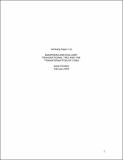Diasporas and Dollars: Transnational Ties and the Transformation of Cuba
Author(s)
Eckstein, Susan
Download16_diasporas.pdf (89.34Kb)
Metadata
Show full item recordAbstract
For many Third World countries, remittances are becoming a more important source of funds than foreign aid, bank loans, and foreign investment, as families find their own transnational solutions to limited homeland economic opportunities. This is true in socialist Cuba as well as in poor market economies. The impact of remittances, however, is contingent on the social relations and social structures in which the foreign currency becomes embedded. What may be good for recipients may be a “mixed bag” for states with their own institutional concerns. Although as a Communist regime Cuba appears to be a strong state with a weak society, remittance dynamics are transforming and undermining as well as bolstering the state. Concomitantly, remittances are strengthening society, but within a transnationalized context, and differentially. Conditions conducive to remittance-sending and the results of the informal dollarization are described and analyzed below, with comparisons made to trends in Central American countries with similar “open” economies but different regime types.
Date issued
2003-02Publisher
Inter-University Committee on International Migration
Series/Report no.
Rosemarie Rogers Working Paper Series;16